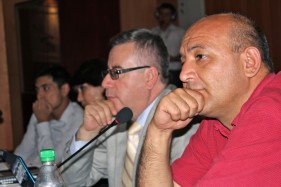
Tajikistan: Promoting collaboration in media development
Lack of professional skills and an increase in the need for training of journalists are two of the greatest challenges for Tajikistan’s media. A two-day meeting in Dushanbe set out to identify the top priorities for future media development in the country
By Gohar Khodjayan
A unique setup in Tajikistan, the meeting brought together local organisations, media outlets and international development organisations to share ideas and experiences from working with Tajikistan’s media.
Independent news and information is limited in the country, and the many journalists join the profession with little or no educational background. As the meeting participants found, this makes for a media community marred by a lack of professional skills.
 A lacking ability to exercise freedom of speech as well as poor access to information and high levels of self-censorship were also identified as key issues in the Tajik media sector. The country’s poor preparations for its digital switchover in TV broadcasting in 2015 were also discussed.
A lacking ability to exercise freedom of speech as well as poor access to information and high levels of self-censorship were also identified as key issues in the Tajik media sector. The country’s poor preparations for its digital switchover in TV broadcasting in 2015 were also discussed.
The two-part meeting covered the work of international organisations working in Tajikistan as well as that of local organisations and media outlets. Over the course of the meeting, participants presented their current activities in the country, pitched new project ideas, and heard Tajik experts discuss the latest developments in the area of access to information for the Tajik media, and the role of the media during the country’s upcoming presidential elections.
The presidential election is set to take place on 6 November, in which President Emomalii Rahmon is expected to run for a fourth term in office. Rahmon has served as president since 1994.
The meeting took place as part of IMS’ efforts to improve collaboration between international and national media development organisations and media outlets in Tajikistan. A follow-up collaboration meeting will take place in spring 2014.




